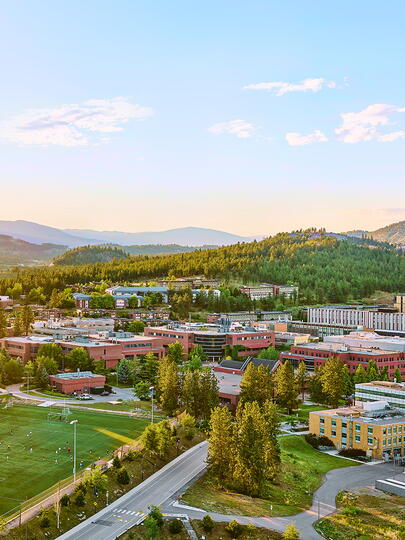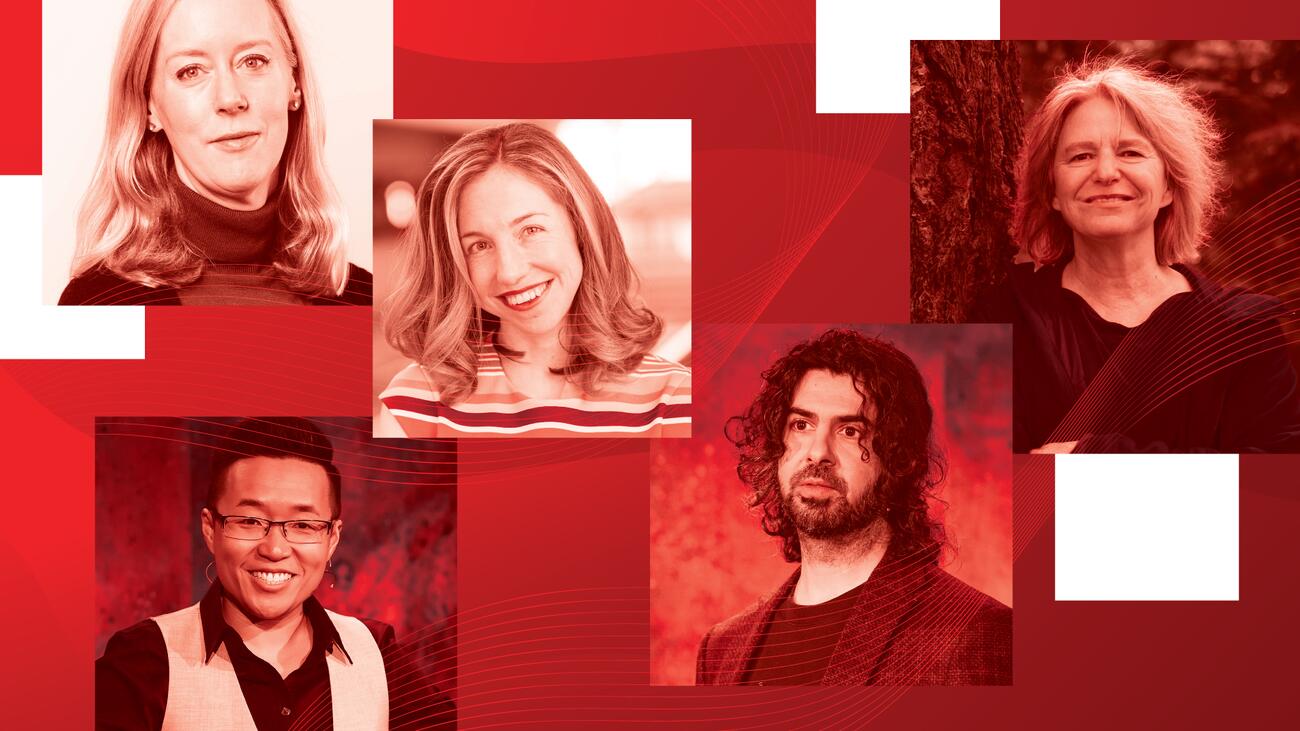UBC researchers reveal hidden worlds in 5 TED Talks
Watch these five TED Talks to uncover secrets about motivation, hard work, happiness, nature, and communication.
Trees and fungi collaborate to create vast communication networks below the forest floor. All of nature is abuzz, and silence is merely an illusion. Helping others and the planet doesn’t have to be a sacrifice — it has the potential to make us happier. Hard work is a virtue, but only up to a point.
Over the past decade, the UBC researchers behind these insights have brought their work to the TED Talk stage. In their talks, which have collectively garnered more than 15 million views, each of them uncovers a hidden truth — some about the natural world, others about human nature. The perspectives they share have the potential to shape how we live and work, deal with the climate crisis, and interact with nature.
1. Dr. Azim Shariff: Does working hard really make you a good person?
It’s not out of the ordinary for a friend or co-worker to ask you to sponsor them to run a marathon for cancer research, but if someone pledged to watch a Sex and the City marathon for the same cause, most of us would be hesitant to donate. Why is that?
UBC alum Azim Shariff (MA’06, PhD’10) is a social psychologist who leads the Centre for Applied Moral Psychology at UBC. His research applies the study of ethics to a smorgasbord of cultural topics, from religion to work to self-driving cars. In his talk, Shariff examines the mental calculus we use to evaluate hard work and reveals the hidden biases that might be leading us astray. If we can rethink our work culture according to the ideas Shariff puts forward, we might be able to strike a better balance between work and life.
Shariff also has a cameo in the next talk — see if you can spot it.
2. Dr. Jiaying Zhao: How to feng shui your fridge — and other happy climate hacks
The enormity of the climate emergency can be overwhelming, and it can be difficult to summon the motivation to act when a climate-friendly life feels like a sacrifice — buy less, drive less, eat less meat. Enter Jiaying Zhao, an associate professor at UBC who offers a fresh perspective on reducing carbon emissions.
A self-proclaimed “human carbon calculator,” Zhao is the Canada Research Chair in Behavioural Sustainability. With expertise in both human behaviour and sustainability, she brings us into a new world of climate action, one where the actions we take to combat climate change also boost our happiness, with benefits to our health, wardrobe, and social connections to boot.
As a happiness-boosting bonus, the talk features many adorable photos of Zhao’s pet bunny, Greenwich.
3. Dr. Elizabeth Dunn: Helping others makes us happier — but it matters how we do it
Reducing our emissions isn’t the only good deed that can make us happier. We can also lead happier lives by helping other people.
Elizabeth Dunn, who collaborated with Zhao to identify happy climate hacks, is a professor of psychology at UBC and principal investigator of the Social Cognition and Emotion Lab, where she studies what makes people happy. Co-author of the book Happy Money, she started her career by demonstrating that people are happier when they spend money on others instead of themselves. The implications of this seemed clear — donating to charity should make us feel good, right?
There is a hidden caveat to Dunn’s early findings: we feel the happiest when we have tangible proof of how our actions have helped others. In her talk, Dunn tells the story of how she came to understand this, through both research and personal experience. Her insights have implications for how we can make the world a better place, using the same happy-hack approach to motivation that Zhao employs to fight climate change.
4. Dr. Karen Bakker: Could an orca give a TED Talk?
Many of the living things most affected by humanity’s impacts on the planet do not have a voice. They cannot tell us their stories. With the help of AI, this could soon change.
Karen Bakker, who sadly passed away in 2023, was a professor of geography at UBC who founded the Smart Earth Project, an initiative dedicated to using digital technologies to address environmental challenges. Recent scientific advancements have allowed us to observe and analyze communication that takes place outside the human hearing range. Bakker helped expose the public to these complex, vibrant, and long-overlooked sounds of nature. The results — and the potential applications — are extraordinary.
Bakker was a prolific author whose works include The Sounds of Life, which explores how technology helped researchers discover this hidden realm of sound, and Gaia’s Web, which is about the role that digital technology can play in protecting the planet.
5. Dr. Suzanne Simard: How trees talk to each other
Just as an entire sonic world pulses outside the human hearing range, there is a vast subterranean world out of sight beneath the forest floor. British Columbia’s breathtaking forests captured Suzanne Simard’s imagination as a child, and she has since built a career on uncovering the secrets of the forest. Named one of TIME’s 100 Most Influential People of 2024, Simard, a UBC alum (BSF’83), is a professor in the UBC Faculty of Forestry, the leader of The Mother Tree Project, and the author of Finding The Mother Tree: Uncovering the Wisdom of the Forest.
In her talk, Simard tells the fascinating story of her research, complete with Geiger counters and grizzly bear encounters, and invites us into a hidden world that we may have walked upon for years without ever knowing.
Simard’s research is a game changer for forest preservation. Through The Mother Tree Project, she is dedicated to championing forestry stewardship that incorporates the interconnectedness of the forest and traditional Indigenous stewardship practices. It is vital that we protect our forests, and in particular the oldest, most well-connected trees so that they can nurture the next generations. The hopeful news is that because of these networks, our forests are regenerative. If we act now, there is hope.
































